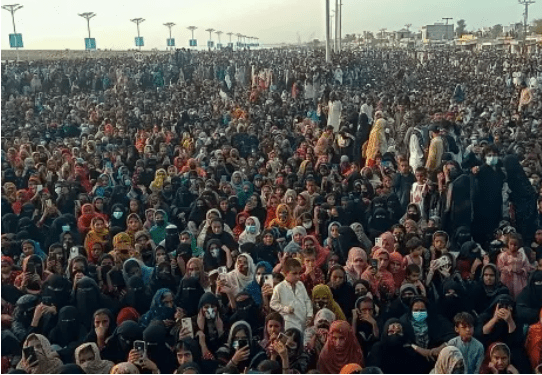
(New York) – Pakistani authorities should exercise restraint in responding to demonstrations in Balochistan province, release all detained for peaceful protest, and restore internet access, Human Rights Watch said today.
Since July 28, 2024, Pakistani authorities have detained hundreds of people in response to the Baloch National Gathering, a march seeking to raise awareness of human rights concerns in Balochistan. Some protesters reportedly attacked security forces, killing one soldier and injuring others. Baloch activists have alleged that government security forces have used excessive force to prevent protesters from reaching the port city of Gwadar, the end point of the march. Government authorities have imposed an internet shutdown on Gwadar.
“Pakistani authorities should uphold the right to peaceful protest and assembly, and when nonviolent means prove ineffective use only the minimum force needed,” said Patricia Gossman, associate Asia director at Human Rights Watch. “It’s vitally important for the authorities to protect protesters’ rights while preventing the situation in Balochistan from spiraling out of control.”
The Baloch National Gathering has called for accountability for the numerous cases of enforced disappearances in Balochistan over many years. Such “disappearances” have long been a feature of the conflict between the government and armed militants in Balochistan. Pakistan’s security forces have also carried out enforced disappearances to silence peaceful critics of the government.
The nongovernmental organization Human Rights Commission of Pakistan reported that some of the march’s organizers received threats to call off the march or face arrest or enforced disappearance. Since July 28, protesters have blocked roads, demanding the release of detained colleagues.
The United Nations Basic Principles on the Use of Force and Firearms by Law Enforcement Officials provide that security forces must never use excessive force. In dispersing violent assemblies, firearms may only be used when other less harmful means are not practicable but must still be used to the minimum extent necessary. Law enforcement officers may only intentionally resort to lethal force when strictly unavoidable to protect life.
Government authorities generally claim that internet shutdowns are necessary to protect public safety and curb the spread of misinformation. However, this sweeping measure denies ordinary people access to lifesaving information, interferes with access to health care, and restricts the ability of journalists to upload photos and videos documenting the government response to the protest. International human rights law prohibits broad, indiscriminate, and indefinite restrictions on fundamental freedoms, including the right to free expression and to provide and receive information, Human Rights Watch said.
The Pakistan government needs to address the issue of enforced disappearances, which are considered to be a continuing offense. International law defines an enforced disappearance as the detention of anyone by state forces or their agents who refuse to acknowledge the detention or whereabouts of the person, placing them outside the protection of the law.
Activists in Balochistan say that there have been 7,000 enforced disappearances in the province since 2004. Since March 2011, Pakistan’s Commission of Inquiry on Enforced Disappearances has received thousands of complaints of enforced disappearances across the country. The victims are most often from the marginalized sections of society, and once forcibly disappeared are often at risk of torture and extrajudicial execution. The government has not held anyone responsible for disappearances accountable.
“Balochistan has the highest number of enforced disappearances in all of Pakistan, with the authorities willfully ignoring calls for accountability for years,” Gossman said. “The authorities should end these abuses, prosecute those responsible, and provide redress for the victims and their families.”






